As the holiday season approaches, pet owners are often left wondering about the safety of sharing Christmas foods with their furry companions.
While some festive treats can be enjoyed by dogs in moderation, there are specific foods that pose significant risks to their health.
Understanding the nuances of what is safe and harmful for dogs during this time is crucial for responsible pet care.
By exploring the intricacies of what your pup can and can't eat during the holidays, you can ensure a joyful and worry-free celebration with your canine friend.
Key Takeaways
- Safe Christmas foods for dogs include turkey, ham, carrots, and cranberries in small, unseasoned portions.
- Toxic Christmas foods for dogs encompass chocolate, eggnog, peppermint candies, and gingerbread treats.
- Harmful foods for dogs like macadamia nuts, onions, grapes, and alcohol can cause serious health issues.
- Alternative treats for dogs include attention, bonding activities, vet-approved treats, and caution with human foods.
Feeding Recommendations for Dogs
How should dog owners approach the feeding recommendations for their pets to ensure optimal health and weight management?
It is crucial for dog owners to be mindful of their pet's caloric intake, especially when it comes to treats. Treats should be given in moderation to prevent obesity, with all treats accounting for less than 10% of a dog's daily caloric intake.
For small dogs, it is recommended to limit treats to 20-50 calories per day, while large dogs should stay within 80-100 calories. Maintaining a healthy weight is essential for a dog's overall well-being, so monitoring treat consumption and ensuring a balanced diet is key to promoting optimal health and weight management in dogs.
Safe Christmas Foods for Dogs
During the festive season, dog owners can safely share certain Christmas foods with their furry companions to enhance their holiday experience without compromising their health. Some safe options include turkey in small, unseasoned, boneless pieces, as well as ham shared in small, unseasoned, boneless portions. Carrots, whether raw, cooked, dehydrated, or frozen, are also a good choice.
Cranberries can be given raw, but owners should watch for choking hazards. Broccoli, both raw and steamed, is generally safe, although it may cause gas in some dogs. By offering these treats in moderation and ensuring they are prepared appropriately, pet owners can include their dogs in the holiday festivities while keeping their health a top priority.
Toxic Christmas Foods for Dogs
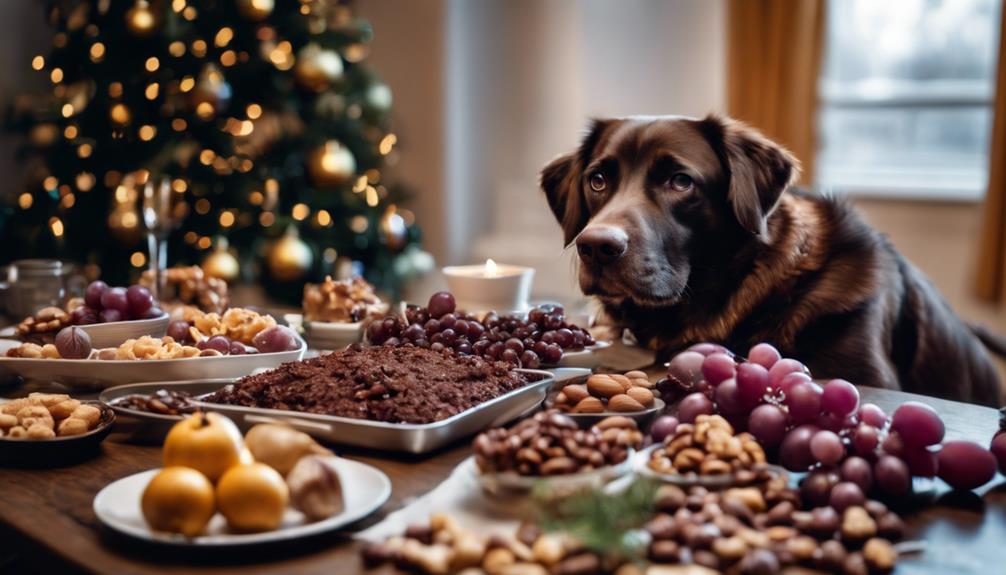
As we shift our focus to the potential hazards lurking amidst the festive season, it's crucial for dog owners to be aware of the toxic Christmas foods that pose risks to their canine companions' well-being.
Here are some common toxic Christmas foods that should be kept away from dogs:
- Chocolate: Contains toxic methylxanthines affecting the heart and brain.
- Eggnog: Harmful due to dairy allergies and high fat content.
- Peppermint candies: Contain xylitol, which is toxic to dogs.
Being vigilant about these items can help prevent accidental ingestion and safeguard your dog's health during the holiday season.
Harmful Foods for Dogs
Identifying harmful foods for dogs is crucial in safeguarding their well-being and preventing potential health risks.
Some foods to be cautious of include macadamia nuts, which can cause lethargy, weakness, vomiting, and tremors in dogs.
Onions and garlic contain substances that are harmful to dogs, while mashed potatoes with ingredients like garlic, chives, and leeks can also be toxic.
Grapes and raisins are known to cause kidney failure in dogs, and alcohol can lead to alcohol poisoning.
It's important for pet owners to be aware of these harmful foods and to avoid feeding them to their canine companions. Regularly consulting with a veterinarian about dietary choices can help ensure the health and safety of your furry friend.
Alternative Treats for Dogs

To ensure the well-being of your canine companion, it is essential to explore safe and suitable alternative treats that can provide both enjoyment and nutritional benefits. When looking for alternative treats for dogs, consider the following options:
- Fruit and Vegetable Snacks:
- Apples slices without seeds
- Blueberries as a tasty antioxidant-rich treat
- Carrot sticks for a crunchy and low-calorie option
- Frozen Treats:
- Homemade frozen yogurt treats
- Ice cubes with pieces of fruit or veggies
- Frozen banana slices for a cooling and potassium-rich snack
- Homemade Treats:
- Peanut butter and banana treats
- Pumpkin and oatmeal cookies
- Sweet potato jerky strips
These alternatives can be a healthy and enjoyable addition to your dog's diet.
Turkey for Dogs
Turkey, a protein-rich meat, can be a safe and tasty option to include in your dog's diet when prepared in small, unseasoned, boneless pieces. It provides essential nutrients like protein, iron, zinc, and B vitamins. However, it is crucial to avoid feeding your dog seasoned or cooked turkey bones, as they can splinter and cause internal injuries. Remember to remove the skin and excess fat before offering it to your furry friend. Here is a breakdown of the benefits and considerations when feeding turkey to your dog:
| Benefits | Considerations | Tips |
|---|---|---|
| High in protein | Remove skin and excess fat | Offer in small, boneless pieces |
| Rich in nutrients | Avoid seasoned or cooked bones | Monitor for any digestive upset |
| Tasty treat for dogs | Use as an occasional treat only | Consult your vet for advice |
Ham for Dogs

When considering ham as a treat for your dog, it is important to be mindful of certain precautions to ensure your pet's safety and well-being. Here are some key points to keep in mind:
- Moderation is Key: Offer ham to your furry friend in small amounts to prevent digestive issues.
- Watch for Seasonings: Ensure the ham is unseasoned and boneless to avoid any potential harm to your dog.
- Consider Alternatives: While ham can be a tasty treat, there are other safer options like lean meats or vegetables that can be healthier choices for your dog's diet.
Carrots for Dogs
How beneficial are carrots as a dietary addition for dogs?
Carrots are a nutritious and safe option for dogs when given in moderation. Packed with vitamins and low in calories, carrots can be a healthy treat or supplement to your pup's diet. The crunchy texture also promotes dental health by reducing plaque and tartar buildup.
Whether raw, cooked, dehydrated, or frozen, carrots provide dogs with essential nutrients like beta-carotene, fiber, and vitamin K. However, it's important to cut carrots into bite-sized pieces to prevent choking, especially for smaller dogs.
Cranberries for Dogs
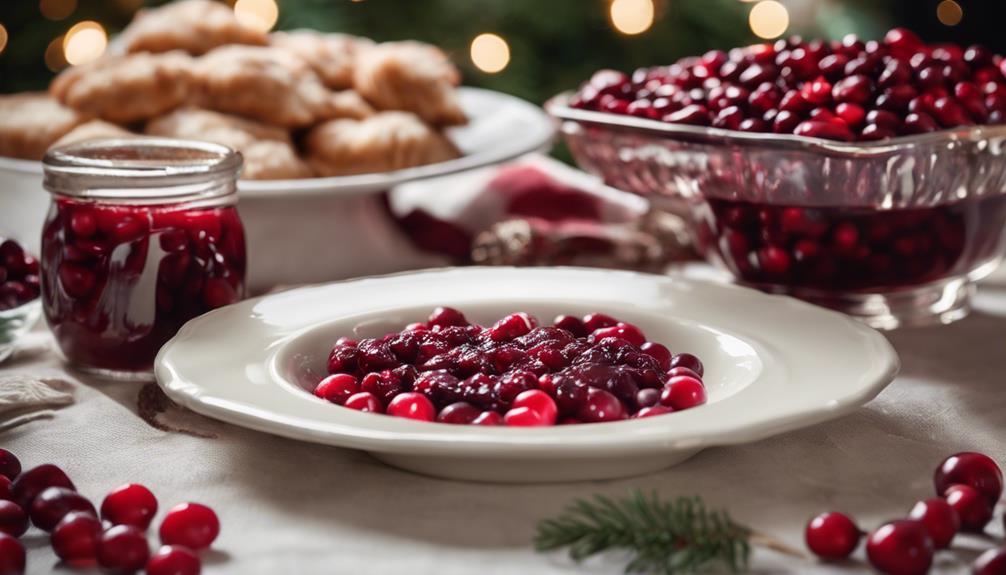
Incorporating cranberries into a dog's diet can offer a range of potential health benefits, provided they are introduced appropriately and in moderation. Cranberries are a nutritious fruit that can provide antioxidants, vitamins, and fiber to support your dog's well-being.
When feeding cranberries to your furry friend, remember to:
- Offer fresh, plain cranberries as a snack or mix them into your dog's food for added flavor.
- Avoid sugary cranberry products like canned cranberry sauce, which may contain harmful additives.
- Watch for choking hazards by ensuring the cranberries are chopped or mashed before serving.
Broccoli for Dogs
Broccoli offers dogs a nutrient-rich addition to their diet, providing essential vitamins and minerals for their overall health and well-being. This vegetable is safe for dogs to consume, whether raw or steamed, although it may cause gas in some individuals.
Broccoli is a good source of fiber, vitamin C, and antioxidants, which can support a dog's immune system and digestive health. When feeding broccoli to your dog, ensure it is given in small, bite-sized pieces to prevent choking hazards.
While broccoli can be a healthy treat for your pup, it should be offered in moderation as part of a balanced diet to prevent any digestive upsets. Remember to consult with your veterinarian before introducing new foods to your dog's diet.
Chocolate Dangers for Dogs
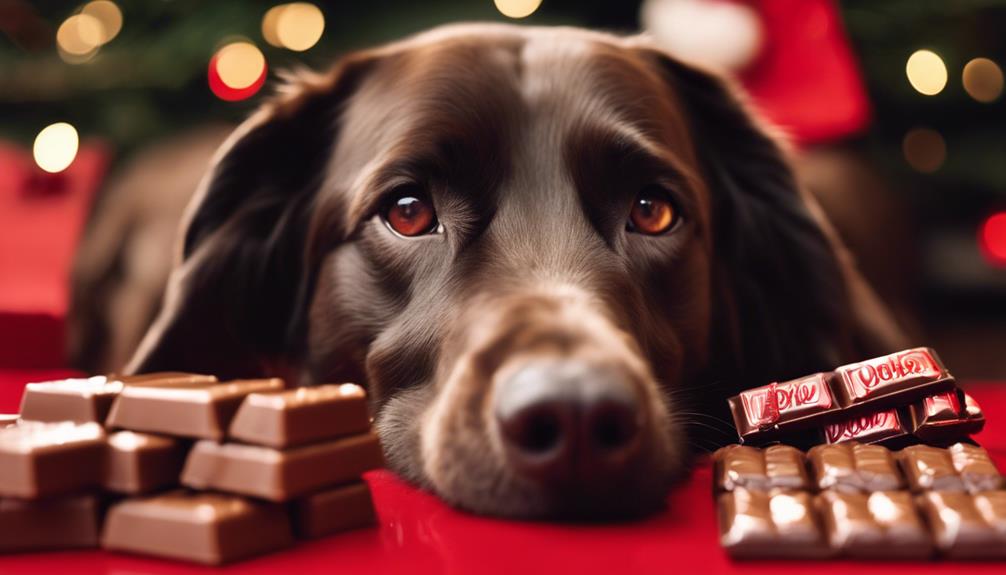
What are the risks associated with chocolate consumption for dogs?
Chocolate contains theobromine and caffeine, both toxic to dogs.
Here are the dangers of chocolate for your furry friend:
- Theobromine Poisoning: Dogs metabolize theobromine slower than humans, leading to toxic buildup in their system.
- Symptoms: Vomiting, diarrhea, rapid breathing, increased heart rate, seizures, and even death.
- Severity Varies: Dark chocolate is more dangerous than milk chocolate due to its higher theobromine content.
Ensure your dog does not have access to any chocolate during the holiday season to prevent potential poisoning and keep them safe and healthy.
Eggnog Risks for Dogs
During the festive season, pet owners must be cautious of the potential risks eggnog poses to dogs' health. Eggnog is a holiday favorite for many, but it can be harmful to dogs due to its ingredients.
Eggnog typically contains dairy, which can be problematic as many dogs are lactose intolerant, leading to digestive issues such as diarrhea or vomiting. Additionally, eggnog is high in fat and sugar, which can cause pancreatitis in dogs if consumed in large quantities.
Nutmeg, a common spice in eggnog, is also toxic to dogs and can lead to neurological problems. To ensure your furry friend stays healthy and safe during the holiday season, it's best to avoid sharing eggnog with them and opt for dog-friendly treats instead.
Peppermint Hazards for Dogs
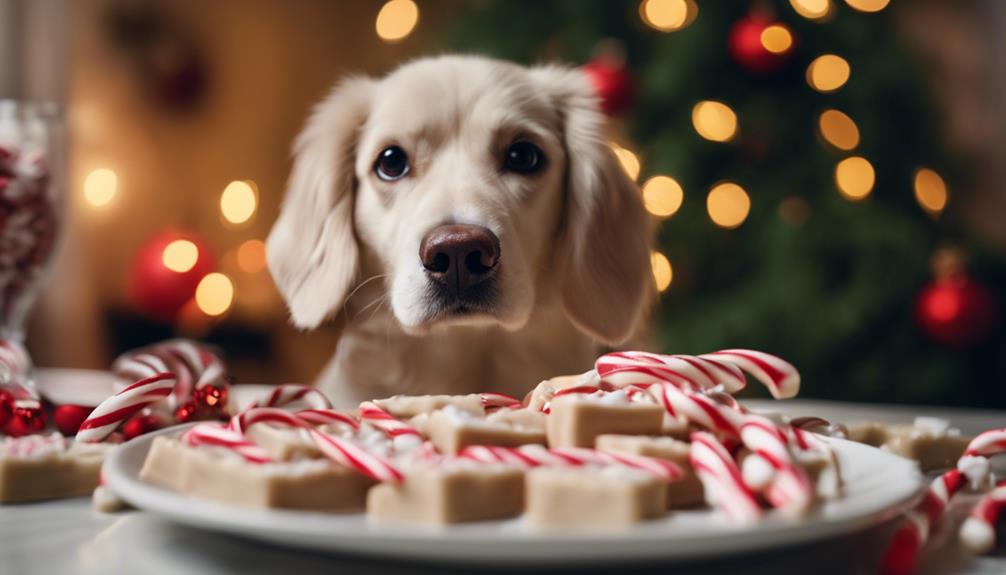
When considering potential hazards to dogs during the holiday season, it is crucial to be aware of the risks associated with peppermint consumption. Peppermint can be harmful to dogs due to certain ingredients like xylitol, which is toxic to them. Here are three ways peppermint can pose a danger to your furry friend:
- Peppermint candies often contain xylitol, a sweetener that is toxic to dogs.
- Peppermint essential oils can be poisonous to dogs if ingested in large quantities.
- Peppermint plants, if consumed in excess, can lead to gastrointestinal upset and potential toxicity in dogs.
Being cautious about peppermint exposure can help ensure your dog's safety during the festive season.
Gingerbread Risks for Dogs
Gingerbread poses potential risks for dogs due to its ingredients and the presence of xylitol, a substance toxic to canine health. Xylitol, commonly found in gingerbread recipes, can cause a rapid release of insulin in dogs, leading to hypoglycemia, seizures, and even liver failure.
Additionally, gingerbread often contains spices like nutmeg and cinnamon, which can be harmful to dogs in large amounts, causing gastrointestinal upset, central nervous system depression, and potentially even hallucinations.
It's crucial to keep gingerbread and other baked goods containing xylitol out of reach of your furry friend during the holiday season to prevent any accidental ingestion and subsequent health complications. Prioritize your dog's well-being by offering safe, dog-friendly treats instead.
General Tips for Dog Treats
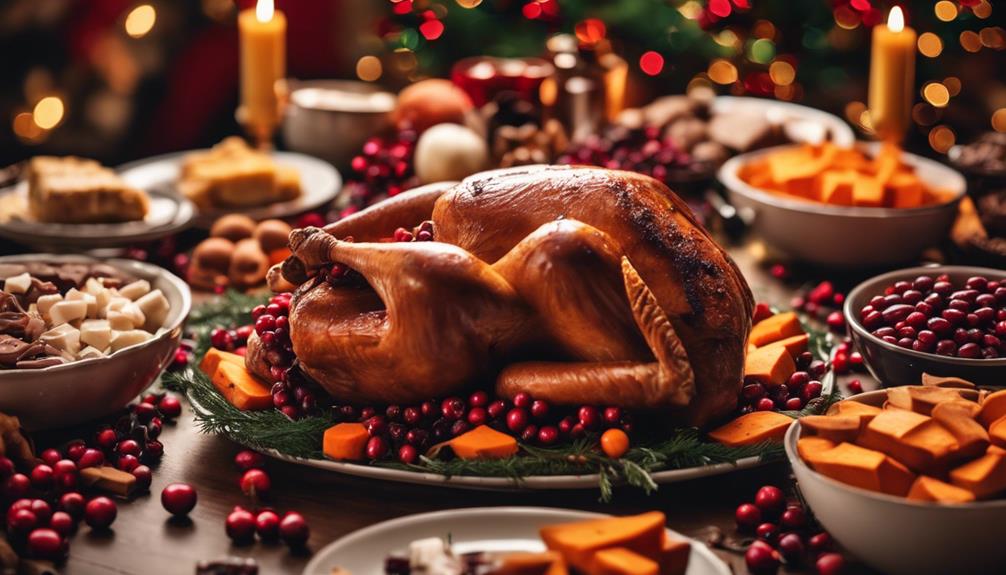
Amidst the holiday season's culinary temptations, maintaining a vigilant approach to selecting appropriate treats for your dog is paramount to ensuring their health and well-being.
When choosing treats for your furry companion, consider the following tips:
- Moderation is Key: Treats should be given sparingly to prevent obesity and should make up less than 10% of your dog's daily caloric intake.
- Caloric Consideration: Small dogs should have 20-50 calories in treats per day, while large dogs can have 80-100 calories to maintain a healthy weight.
- Consult with a Vet: Before introducing new treats, it is always advisable to consult with a veterinarian to ensure the safety and appropriateness of the treats for your dog's dietary needs.
Conclusion
In conclusion, it is crucial for pet owners to be aware of the Christmas foods that are safe and toxic for dogs. By following feeding recommendations, offering safe treats, and avoiding harmful ingredients such as chocolate and alcohol, dog owners can ensure the well-being of their furry companions during the holiday season.
Consulting with a veterinarian for guidance and being mindful of potential risks associated with festive foods can help maintain a healthy and happy holiday for both dogs and their owners.




